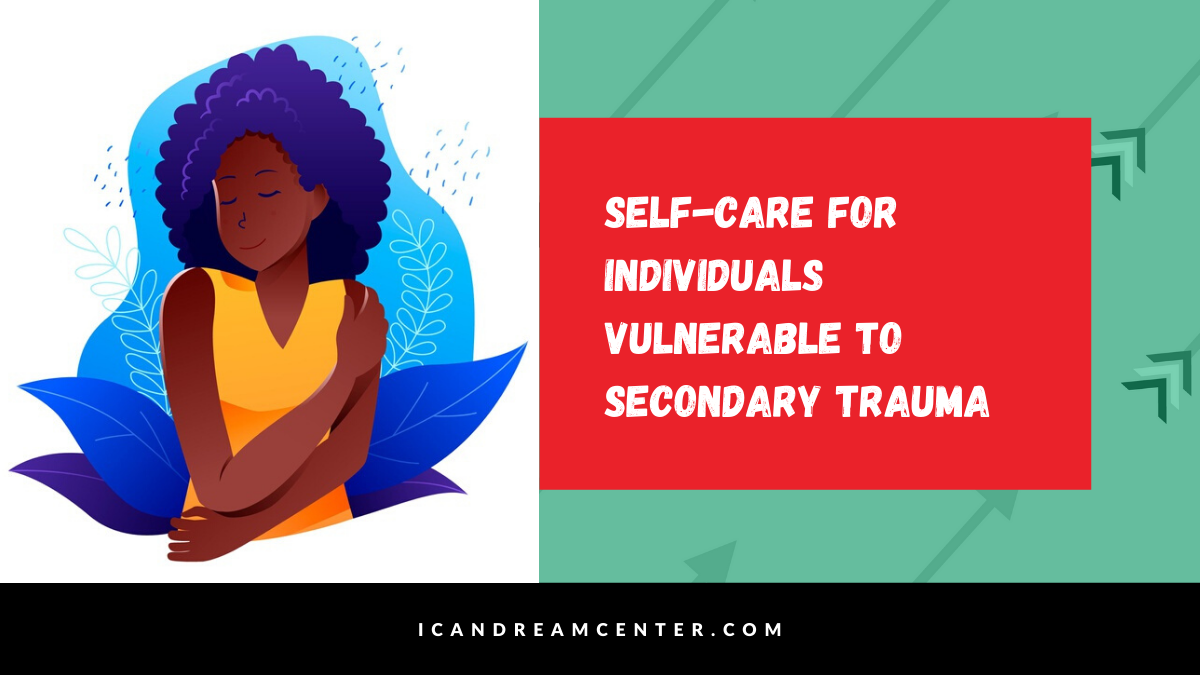
Self-Care for Individuals Vulnerable to Secondary Trauma
At the iCan Dream Center we serve a vulnerable population of students who may have intellectual, emotional, or behavioral disabilities. A part of serving our students to the best of our abilities begins with creating meaningful relationships with them to foster genuine care to help them navigate through adversity, roadblocks, and traumatic experiences in various settings. However, any health care provider of educator working directly with a client who’s undergone trauma is vulnerable to acquiring mental and/or emotional trauma/stress themselves. Over 40% of teachers report feeling high stress every day during the school year, this is one of the highest stress rates of any career (Yang, 2006). If professionals do not commit to adequate self-care, they can become overwhelmed, stressed or worse burned out.
University of Buffalo’s School of Social Work explains self-care as, “activities and practices that we can engage in on a regular basis to reduce stress and maintain and enhance our short- and longer-term health and well-being”. Many people have given the advice to someone else to partake in self-care but neglected to take care of themselves. When someone is not engaging in proper selfcare it can affect their effectiveness professionally, such as beginning to feel unable to concentrate or plan activities/lessons. Additionally, a lack of self-care can increase impatience and irritability students or collogues. If a person consistently notices intrusive feelings and thoughts about a student’s trauma it may be another sign that they should increase their amount of self-care activities. All in all, it is important to do emotional/mental scans to monitor “compassion fatigue” manifesting in the interaction’s practitioners may have with their students and coworkers (Figley, 1995).
Self-care is typically referenced as general activities that gives someone momentary relief. However, self-care should be tailored to each individual. According to Nami the National Alliance on Mental Illness, there are six components of self-care; they include physical, psychological, emotional, spiritual, social and professional and in order to achieve self-care every component should be addressed. It can be beneficial to create a self-care plan where you begin by evaluating the situations that are causing you the most stress. When evaluating these situations its important to note where stress can be alleviated for example is there is a situation that a boss can provide assistance for that would relieve some pressure. Additionally, a self-care plan should include one activity per each component mentioned above and these activities should be done daily. Lastly, it can be easy to evaluate and plan, but execution is one of the hardest steps in self-care. To boost the process of execution, create a thorough schedule of when each of these activities will be completed in the day. A takeaway tip is creating 6 alarms in your phone and label them with the self-care activity that fits your needs. Remember that if you don’t take care of yourself it will become impossible to properly take care of the people around you.
Resources
Figley, C. R. (1995). Compassion fatigue: Toward a new understanding of the costs of caring. In B. H. Stamm (Ed.), Secondary traumatic stress: Self-care issues for clinicians, researchers, and educators (p. 3–28). The Sidran Press.
“Introduction to Self-Care.” University at Buffalo School of Social Work – University at Buffalo, 13 Sept. 2018, socialwork.buffalo.edu/resources/self-care-starter-kit/introduction-to-self-care.html.
National Alliance on Mental Illness. Self-Care Inventory. Retrieved from nami.org: https://www.nami.org/getattachment/Extranet/Education,-Training-and-Outreach-Programs/Signature-Classes/NAMI-Homefront/HF-Additional-Resources/HF15AR6SelfCare.pdf. Yang, X., Ge, C., Hu, B., Chi, T., and Wang, L. Relationship between quality of life and occupational stress among teachers. Public Health, 123(11), November 2009, pp. 750-755.
